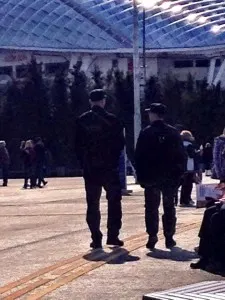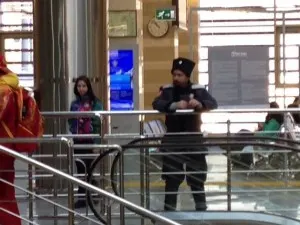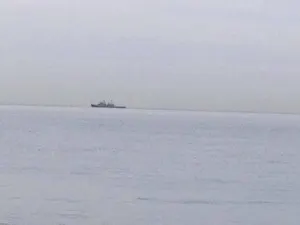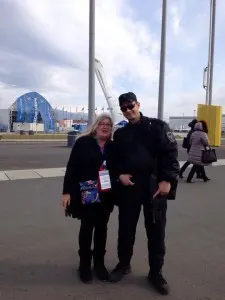
Validating security credentials
One of the media’s favorite pre-Olympics topics was security threats at the Sochi Games. When we were traveling in Europe prior to arriving in Sochi, we could tell when the U.S. media ramped up the hype on how unsafe our destination was going to be. We got many email and social media messages from concerned relatives and friends every time this happened. They worried about our personal safety, warned us about electronic hacking and being robbed of our belongings, and wondered would we be reconsidering or canceling our plans.
At one point, even I started to question the wisdom of proceeding on to Sochi. The U.S. State Department issued a travel warning, with a replacement update through March, 2014 which they called an “alert.” We had already purchased a comprehensive travel insurance policy with medical evacuation and repatriation coverage in the event of a personal accident or unsafe situation. Pete had thoroughly researched the issues regarding electronic security, and we followed through with the most pertinent recommendations prior to leaving the United States. If you’d like the details, here’s a link to his plan. I responded to all the personal messages by saying thanks, we’re aware of the situation, we’ve implemented layered security precautions on our devices, and we’ve got great insurance. Still, I was uneasy and trying to stay positive.
It’s very hard to separate the sensationalist media implications from actuality until you’re there. Even so, the widespread story about an NBC journalist getting hacked within minutes of arriving in Sochi warranted a review of what actually happened before we arrived in Sochi. This story didn’t pass the smell test. First of all, the guy opens an email and “downloaded a virus.” Who downloads an unknown file without checking it out first? Also, his Android phone and Mac computer were straight out of the box, with no known virus protection. Someone smarter than us summarizes the fraud in this viral story:
By the way, the easy way to figure out where journalists commit fraud is by watching for “passive voice”. Journalists normally avoid passive voice, preferring stronger language. But, when they need to hide things, they passive voice to cover up details. Saying “was hacked” covers up the fact that Richard Engel hacked himself by knowingly downloading a hostile Android app. In other word, active voice wouldn’t have worked, because it would have required identifying who put the virus on the phone. He couldn’t report that a “hacker put the virus on the phone” because the hacker didn’t, Richard Engel did. He couldn’t very well have reported, in the active voice, “I downloaded the virus”. Thus, the passive voice, “the phone was hacked”, avoiding this inconvenient detail of who did what.
Nice job, NBC. Write a story about being hacked in Sochi while you’re in Moscow. Visit spurious websites. Download a hostile attachment on your new Android phone after you’ve deliberately disabled its security. #Fail We felt a lot better about our electronics before we even got to Sochi after realizing this was fraudulent sensationalism, pure and simple.

Armed police at Coastal Cluster
The second big fear promulgated in the media was personal safety based on terroristic threats, which we took more seriously due to the December, 2013 incidents in Volgograd. Immediately, major media outlets began speculating about security issues in Sochi, 400 miles distant. We knew we’d be arriving at a heretofore unknown to us airport, taking public transportation to event venues, and at the venues themselves – all great locations for a potential terrorist attack. The Games have been targets for terrorists since Munich, 1972. We resolved to be very much on guard.
When we arrived in Sochi, we immediately noticed an increased security presence, much more than we were used to even in post-9/11 America. There were police, private security guards, Olympic security volunteers, and even Cossacks positioned everywhere: at transportation hubs and bus stops, in front of banks and in public areas, and as you might imagine, all over the public venues. It was clear the Russians were taking security very, very seriously. As I wrote at the time, the overall effect of this was reassuring, not forbidding.
At the Olympic venues, the security precautions were even more palpable. Whenever you entered a venue or a transportation hub, you were required to present your event tickets and your spectator credentials, which you had to initially validate in person with your passport at the beginning of your stay at an official accreditation center. This process data populated the security screening system, which photo-identified you as your belongings and yourself were scanned. There were also friendly same-sex, non-invasive patdowns, performed methodically and non-apologetically, but with a smile and a thank you. We saw no one object to these stringent measures.

Cossack in traditional dress
As we traveled by commuter train from the Adler Transportation Hub to the Mountain Cluster, I noticed armed police officers stationed about every 100 feet along the elevated water lines that were parallel to the train tracks, which ran along the river. When we arrived at Krasnaya Polyana, the mountain transportation hub, there were Cossacks patrolling the public areas, watching the escalators and making other observations. On the bus ride up to the Rosa Khutor Extreme Sports Center, we noticed snow camouflage blinds with armed Special Forces on skis watching the roadway, which zig zagged up the mountain side. The steep, almost vertical mountain sides made for great vantage points.

Warship offshore Adler
As we walked along the Black Sea in our Adler resort neighborhood – a neighborhood with very few non-Russians, I might add – several miles from the Coastal Cluster, we could see the warships anchored off shore, ready for deployment in case of an incident. Again, while some may have thought this was overkill, we appreciated it. Even the sensationalist media conceded security efforts were paramount and comprehensive, with over 37,000 officers (public and private) contributing to the security presence.

Betsy with policeman
Ever vigilant, the media is now reporting that security is “uneven,” or even relaxed, while simultaneously confirming our observations on the way to the Mountain Cluster, and at the mountain venues themselves. Other outlets complain that the United States is being “shut out” of the Russian security operation despite the fact that the American ambassador to Russia expressed satisfaction at the level of cooperation.
What should you believe? Our thoughts: consider the source and orientation of the information you’re using to form an opinion. Nothing beats first hand experience. Is there the potential for agenda-based communication? Absolutely! Despite the calls for depoliticization of the Games, our observations were that media reports were definitely agenda-driven.
While we can’t bring ourselves to say there may have been some who hoped for a security-based fail, a more cooperative or positive reporting stance may have influenced visitors to come to the Games, rather than staying away. Coupled with the negative reporting about unfinished construction details and cultural differences, we think casual media consumers definitely have the wrong impression about Russia and the Sochi Games.
We certainly don’t have rose-colored glasses when it comes to Russia’s history and politics, but in our opinion, these Olympic Games were an opportunity to build bridges. It seems to us as though that was the last thing our politicians and western media wanted to do. For shame.
Tips for Trip Success
Book Your Flight
Find an inexpensive flight by using Kayak, a favorite of ours because it regularly returns less expensive flight options from a variety of airlines.
Book Your Hotel or Special Accommodation
We are big fans of Booking.com. We like their review system and photos. If we want to see more reviews and additional booking options, we go to Expedia.
You Need Travel Insurance!
Good travel insurance means having total peace of mind. Travel insurance protects you when your medical insurance often will not and better than what you get from your credit card. It will provide comprehensive coverage should you need medical treatment or return to the United States, compensation for trip interruption, baggage loss, and other situations.Find the Perfect Insurance Plan for Your Trip
PassingThru is a participant in the Amazon Services LLC Associates Program. As an Amazon Associate I earn from qualifying purchases.
To view PassingThru’s privacy policy, click here.

Russians: What We Think vs What We Know - Passing Thru
Tuesday 4th of March 2014
[…] Sochi Security: What We Saw […]
Hilary
Tuesday 4th of March 2014
Hi Betsy .. just so glad you went ... I gather that people were able to get around quite easily, as it wasn't that full - which I guess made it much nicer - less queues etc ... and not hustle and bustle of crowds ...
Interesting to read your posts though .. cheers Hilary
Betsy Wuebker
Tuesday 4th of March 2014
Hi Hilary - yes, it's true. There was no impediment due to crowding, and I'm very sensitive to that. I am happy that so many Russians attended, too.
Becky Blanton
Wednesday 19th of February 2014
I agree...the media does ramp things up. Crime happens everywhere. When I was in Uganda there were warnings from officials close to us that we knew who warned us away from shopping malls and stores after the bombing and shootings in Kenya, 100 miles away. Terrorists less than 50 miles from us were blown up while making bombs, and there was always an armed presence everywhere. Maybe I was being naive, but I didn't feel fear, just an uneasiness because of the looks we got being white in a black country. I was initially afraid to go to Africa at all, but put that aside for the opportunity. I've now been twice and really enjoyed it and am so glad I made the decision to go. Glad you guys did likewise and didn't let fear put you off!
Betsy Wuebker
Friday 21st of February 2014
Hi Becky - Since we've been back, we've heard comments from people who are believing the media hype, particularly with respect to the Opening Ceremony lighting glitch, as in, what happened to the person making the mistake. smh I agree with you that it's important to acknowledge our fear and proceed as we think best!